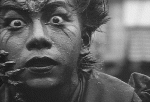While immensely lagging with my reading queue, I was looking at my copy of Gravity’s Rainbow, menacing to start reading it. Not yet, but there’s this quote from Weisenburger’s companion book:
In my view, the most significant revelation of the annotations is that Gravity’s Rainbow unfolds according to a circular design. Across the novel’s four parts, historical events intersect the Christian liturgical calendar, suggesting possibilities for return and renewal, but possibilities that Pynchon’s satire hopelessly equivocates on. This means that readers might have a novel as elegantly modeled as Joyce’s Ulysses and have their deconstructionism too. Indeed, one might well read Gravity’s Rainbow as a satire on the very desire for grand plots or metanarratives, a desire the narrative unmasks as the terrible dynamic of a culture huddling on the brink of nuclear winter.
If it’s accepted that GR is a book squarely within the postmodern canon, to the point of representing it fully, then from my point of view what’s written there contains the most manifest aspect of postmodernism.
Try to abstract the pattern there. This quote says the book is modeled carefully, as a meta-structure or a kind of organization that exists on a different level. At the same time, these two levels wrap around (return and renewal). So, abstracting, we have a dichotomy of structure that at the same time returns on itself. What have I just described? Self-reference.
The pattern described can be narrowed down to a line of that quote: “have a novel as elegantly modeled as Joyce’s Ulysses and have their deconstructionism too”. Which is made of a blatant abstraction: “have a cake and eat it too”. Again, this is Gödel and self-reference. The structure has its built-in paradox of the dichotomy of the mind.
On top of that basic pattern there’s also the postmodern “flavor”: satire and humor. Mocking the very premises, the supports you’re standing on. Which becomes, in a circular way, self-reference on itself: what makes the novel is what is mocked, yet is what is relied on, yet is what is mocked (and so on, see the next quote). This self-reference is both object and subject (being self-reference), it’s both validated and then demolished. Serious-and-not. Self-doubt of the self-feeding kind, degenerating into the neurotic (so “of the mind”, which is the point, since it’s literature, which is of the mind, which is the point).
While Pynchon surfs the wave of postmodernism, on the very razor edge, without bleeding. David Foster Wallace instead cut himself.
Writing is a dangerous sport.
Infinite Jest, despite the jest, loves, carefully builds and worships its meta-strcuture. It is god-like as it gets in literature. Yet there’s the deep suffering in the background that is as authentic as it gets. It takes itself VERY seriously.
There’s this super short story by DFW, with its droning, neurotic, looping last line:
A Radically Condensed History of Postindustrial Life A short story by David Foster Wallace
When they were introduced, he made a witticism, hoping to be liked. She laughed very hard, hoping to be liked. Then each drove home alone, staring straight ahead, with the very same twist to their faces.
The man who’d introduced them didn’t much like either of them, though he acted as if he did, anxious as he was to preserve good relations at all times. One never knew, after all, now did one now did one now did one.
Nothing is real, especially what I’m telling you.

